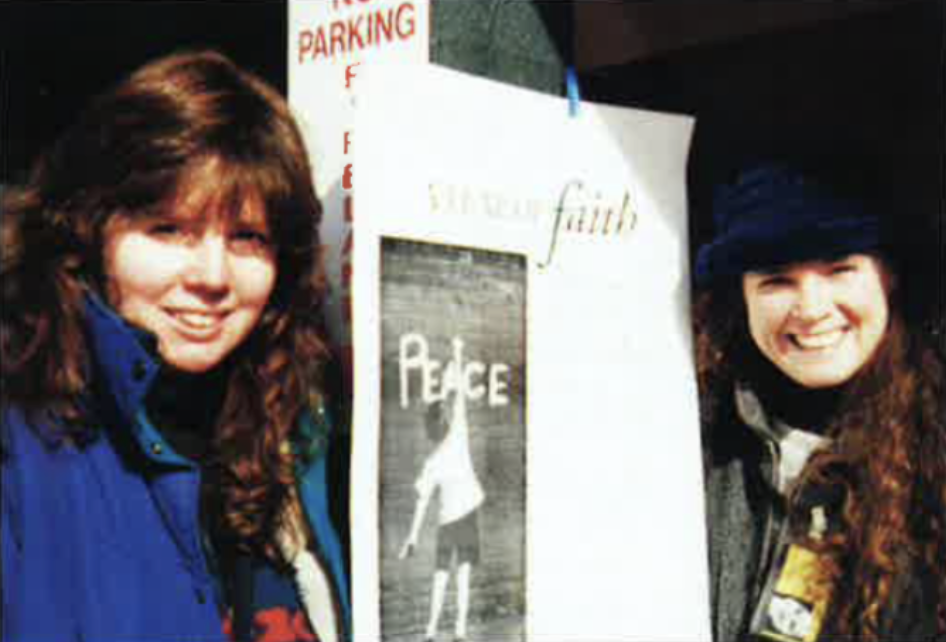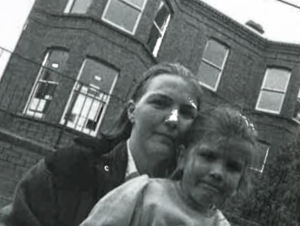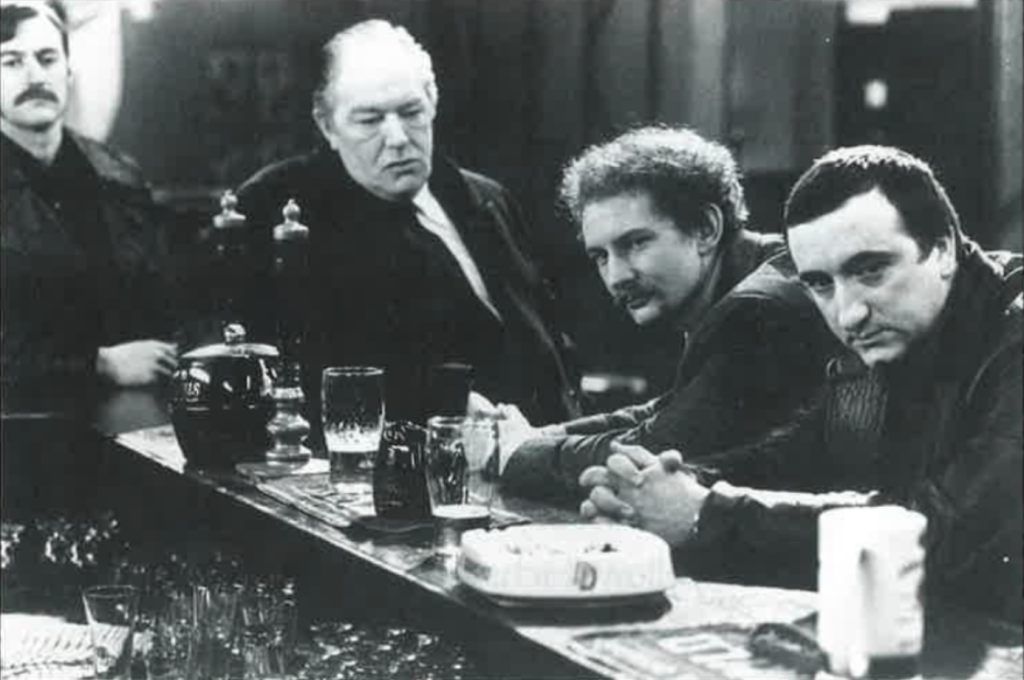Irish entries with a Northern flavor at the Sundance Film Festival.
Park City Utah, home of the increasingly popular Sundance Film Festival, is a long way from Belfast, Northern Ireland. The only thing vaguely Irish in this ski village nestled in the Watsach mountains just east of Salt Lake City is the dark beer served in one of the town’s most popular bars. It’s called “Irish Stout.” But in late January, a few of the 10,000 agents, producers, actors and mere partygoers who descended upon Park City had a chance to see two films dealing with the “Troubles” in Northern Ireland.
A Leap of Faith is an 86-minute documentary by first-time filmmakers Jenifer McShane and Tricia Regan, two Irish American women who took their own leap of faith by investing personal money in a film about Catholic and Protestant parents who successfully opened the Cranmore integrated primary school in Belfast. The other Irish picture, a theatrical drama called Nothing Personal, looks at the insular world of a group of Protestant paramilitaries as they patrol the streets of Belfast during a temporary ceasefire in 1975. While dealing with different time periods and different social and class groups in Northern Ireland, both films confront the legacy that 25 years of violence and hatred has imposed upon Belfast’s children.
Jenifer McShane’s trip to Sundance was made by way of Ballymena, Northern Ireland. She left a well paying job at CBS News in 1989 to work at an integrated primary school there. Three of her four grand-parents were born in Northern Ireland. “I did everything from scrubbing walls to tutoring kids,” McShane explained. That experience inspired her to return home to Queens, New York, in search of producing partner and enough money to return to Ireland to shoot a film about people who were looking for ways to break through the barriers that have kept Protestants and Catholics segregated for hundreds of years. Back in New York, Tricia Regan had recently graduated from photography school and was contemplating enrolling in film school. “I met Jenifer and she was so enthusiastic about how this religiously integrated school in Belfast was changing people’s lives,” Regan said. “I figured I’d just spent my tuition on making a film rather then studying about films for four years.”
The producing partners spent a great deal of time fundraising and pitching their project to every conceivable supporter. They received minimal help from American sources but did obtain some funding from RTE, Ireland’s national station, and Ulster Television. “If we had done a film on Irish step-dancing I’m sure we would have attracted a lot more support,” Regan ruefully explained. They ran out of money before the $200,000 project was completed and McShane was faced with taking out a second mortgage on a home she inherited after the death of her father.
At Sundance, after a packed screening, McShane expressed her gratitude. “I think my father would have wanted me to complete this film,” she said. “He was proud that I was taking risks that he was not able to take.” That risk paid off for both McShane and Regan when the Sundance Film Festival called the day after Thanksgiving to inform them that A Leap of Faith had been one of sixteen documentaries picked from over 200 submissions for the prestigious festival.
McShane and Regan followed four families between August of 1993 and June of 1994 as the parents helped prepare the school for opening and reflected upon the violence that convulsed Northern Ireland leading up to the Irish Republication Army and Protestant paramilitary ceasefires.
The film is strengthened by Liam Neeson’s narration, which provides a brief historical background of the creation of the Northern Irish state. That minimal information is essential for American audiences who tend to regard the violence in Northern Ireland as an incomprehensible battle between warring “tribes.” One of the most wrenching pictures in the film is a black and white still shot of a Protestant Orange parade of bowler-clad men and young boys strutting triumphantly down the middle of a Belfast street. The camera pans slowly across the picture to a child not more than five years old holding a toy rifle pointed straight at the marchers.

With the exception of one single working-class Protestant mother, all of the parents come across as being from the middle and professional classes. There are few voices from the Catholic Falls Road. They are tolerant, perfectly reasonable, well groomed and articulate about wanting to overcome the bitter legacy of sectarianism. In the United States they would be considered good liberals, people with an endless belief in the healing potential of “education” and “good will.” “I just wish people would realize that we are all the same inside if we just realize our common humanity,” one of the parents says. It’s an admirable sentiment and the film’s major conceit and flaw. Could there be any people more different then these wonderful parents who are attempting to help their children overcome legacies of bigotry, and the Reverend Ian Paisley, who is featured in the film making a characteristic denunciation of Catholics and the Irish Republic?
One the Catholic side, a Father Faul revealingly outlines the “true” hidden power behind the move toward integrated schools: a British conspiracy to repress growing Catholic educational strength and the filthy tide of secularism. “We must pound the Catholic world-view into our children every minute of every day,” admonishes Father Faul. Needless to say, this particular type of protection against the encroaching evils of modernity is not likely to be provided at Cranmore school. But to explain why Paisley and Faul have mass followings and only one to two percent of parents in Northern Ireland choose integrated schools is to confront a much more complex, profound and ultimately more interesting problem than the one that is dealt with in A Leap of Faith.
Jenifer McShane and Tricia Regan are brave filmmakers. They have spent five years of their lives bringing to the screen a story they felt passionately about. Their film-making experience was in many ways a metaphor for the struggle to bring the school they filmed to life. In a short question and answer period after the premier in Park City, Regan pointed out that “we were not trying to pass a judgment on what should be done in Northern Ireland. It’s not our country. But I do believe firmly that violence leads to further violence and someone has to interrupt the pattern.”
Even after Sundance, McShane and Regan are $80,000 in debt and looking for a distributor. The men, women and children that they chronicle in A Leap of Faith are also courageous. The young Protestant mother had to hide the fact that she was sending her child to an integrated school to avoid persecution from her neighbors. It is the cruel fate of Irish history and contemporary politics that has sadly relegated them to the margins of contemporary Northern Irish life.
At the end of the screening of Nothing Personal, director Thaddeus O’Sullivan walked to the front of the packed theater with two actors from the film and asked if there were any questions from the audience. A couple of perfunctory queries followed about budget and his other projects, and then complete silence. After an uncomfortable minute staring at the audience, James Frain, one of the actors who had joined O’Sullivan up front, suggested that the movie was very difficult to talk about and that perhaps everyone should just leave.
There was good reason for the silent audience. Nothing Personal is a wrenching film that covers two days in the nightmare lives of a Protestant paramilitary gang on the rampage in Belfast, and a Catholic single father of two who joins his working-class neighbors in an evening street battle and ends up on the wrong end of the gang’s grisly work. It is also an acting tour de force, with world class performances by Frain (Kenny), John Lynch (Liam) who starred in Cal and more recently The Secret of Roan Inis, and Ian Hart (Ginger) who plays a deranged Protestant gunman with a penchant for indiscriminate killing.
The characters in Nothing Personal do not talk of learning to tolerate the divergent beliefs of their Protestant and Catholic brothers. If they know what street you come from, they know if you are one of us or one of them. The film, shot in Dublin for political reasons, looks every bit like the dividing line that separates the Catholic Falls and Protestant Shankill Roads in Belfast. The daily philosophy there is fairly simple: every inch given is an inch taken. Or as Frain’s character Kenny puts it to his Protestant political godfather: “You asked me to protect this community. I do that by finding IRA bombers and killing them.” Unfortunately, IRA gunmen do not carry signs stating that they are currently on active duty, so any Catholic they happen across has to suffice.
O’Sullivan brilliantly captures the process by which violence starts out as a justifiable response to “historical injustice” or the desire to “protect our community” and ends up as violence for its own sake.
At Sundance O’Sullivan explained his approach to the paramilitaries. “It’s important for the gang that they see themselves as a regular army, as defenders of the Union, defending a historical tradition. They try to face the IRA but if they can’t there are those in the group who choose to kill any Catholic.”

Nothing Personal is a film that stays close to home and to the tensions that exist in the “little platoons” when the leader of a militant group understands that his rationale for violence has largely disappeared. The most compelling performance is given by Hart who plays Ginger, a ragefilled maniacal killer who careens out of control through the course of the film. When Ginger is asked by gang leader Kenny why he does what he does, he can only muster a lame “you know, King Billy. We are the people. Buy us a pint.” If the world was just, both Hart and Frain would be nominated for Oscars.
While the film deals peripherally with the dark world of IRA and loyalist paramilitary politics, Nothing Personal is not a political film. You will not gain an understanding of the “positions” of the various political parties or refined ideological positions of Sinn Fein or the Ulster Unionists. But you will definitely be captivated. Nothing Personal did not have an American distribution deal as of the first showing of the week long festival, but O’Sullivan was confident it would be picked up.
In an interview with Irish America after the showing in Park City, O’Sullivan indicated that the reception for the film in Ireland was mixed. The nationalists, he said “do not like the portrayal of the IRA because it doesn’t tell their story. You just see the IRA killing people.” (The film begins with an IRA bomb that kills several civilians in a Protestant pub.) O’Sullivan is not deterred by criticisms that the film is not fair to the IRA. “In the film there is no warning about the bomb. That’s true. But if the IRA was so concerned about innocent civilians they wouldn’t have planted bombs where civilians go.”
Last year at Sundance, surprise Grand Prize winner Ed Burns was not asked such serious questions about The Brothers McMullen, his comedy about the romantic foibles of three Irish American brothers. This year at Sundance the Irish themes were at once hopeful and reflective of Northern Ireland’s darker past. Seventeen months into a precarious peace process, in two small theaters in the middle of Utah, hundreds of people took time away from deal-making to engage Jenifer McShane, Tricia Regan and Thaddeus O’Sullivan about what that peace process means for Ireland and America. Amidst the soft snow in Park City, Utah, that may be all that you can ask of art.
Editor’s Note: This article was originally published in the March/April 1996 issue of Irish America. ⬥


Leave a Reply